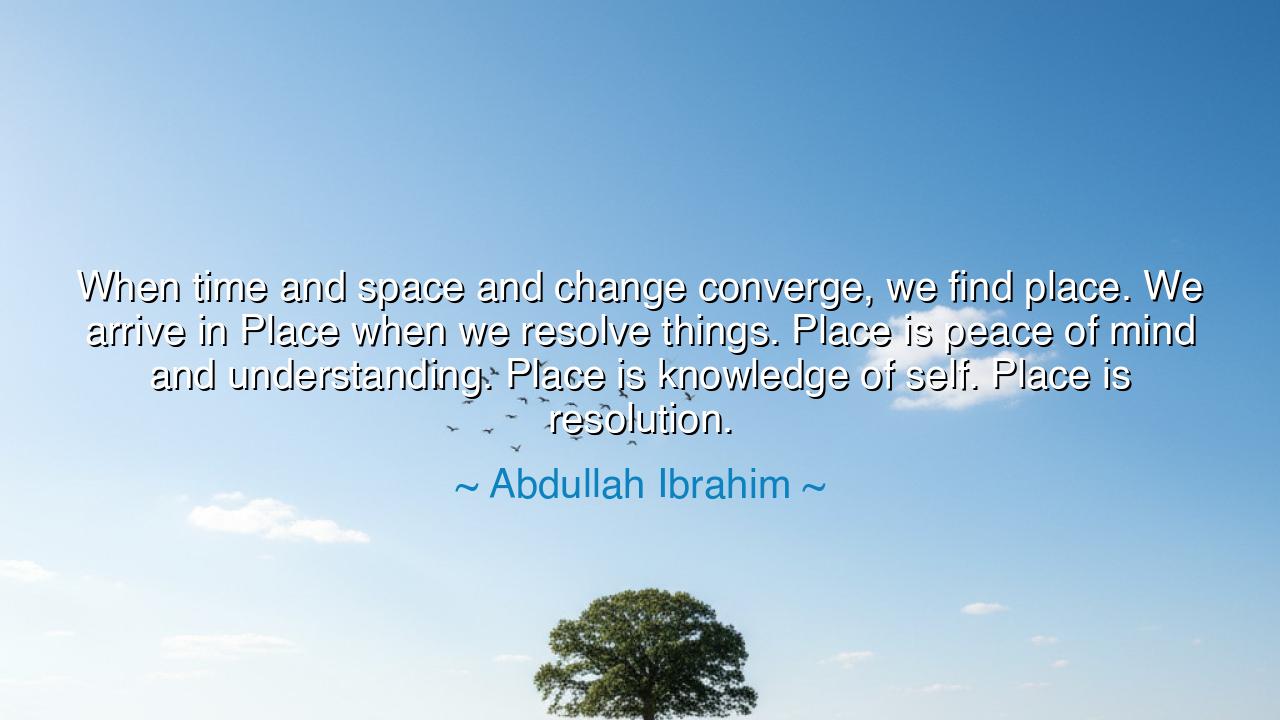
When time and space and change converge, we find place. We arrive
When time and space and change converge, we find place. We arrive in Place when we resolve things. Place is peace of mind and understanding. Place is knowledge of self. Place is resolution.






Abdullah Ibrahim, the great South African pianist and composer, once gave us words that resound like music carried on the wind: “When time and space and change converge, we find place. We arrive in Place when we resolve things. Place is peace of mind and understanding. Place is knowledge of self. Place is resolution.” In these words, he is not speaking only of geography or soil, but of the inward homeland where the restless spirit comes to rest. Place here is not a point on a map, but a state of being, a harmony of life’s elements when conflict is quieted, when self-knowledge blossoms, when peace of mind is achieved.
The origin of this wisdom flows from Ibrahim’s own life. Born in South Africa under the shadow of apartheid, he lived through exile and displacement, carrying his music as a language when his tongue was silenced. He knew well the weight of time, the ache of space, and the power of change. Yet through it all, he found within himself a center, a ground, a place that no oppression could strip away. His words carry the authority of one who wandered and yet came home, not always in land, but in spirit.
This truth echoes in the stories of countless souls. Consider the life of Nelson Mandela, who endured twenty-seven years in prison, cut off from his land and his people. For him, time was cruel, space was confining, and change seemed distant. Yet in that crucible, he resolved his anger, discovered deeper strength, and came to a profound knowledge of self. When he emerged, he was not merely freed from a cell; he had arrived at his Place—the peace of mind and understanding that allowed him to lead with forgiveness instead of vengeance.
The ancients too knew this wisdom. The wandering of Odysseus across seas and storms was not merely the journey to Ithaca, but the struggle to resolve within himself what it meant to be a man, a husband, a king. His Place was not found until time, space, and change had done their work upon him. It was only after trials, losses, and revelations that he stood upon his homeland again, not as the same man who had left, but as one transformed, bearing the weight of understanding.
The meaning of Ibrahim’s words is thus clear: Place is not given—it is found. We reach it not by walking, but by resolving; not by conquering, but by understanding. It is the inward peace that comes when we have faced our conflicts, embraced our changes, and accepted the passage of time. Many wander through life never arriving, because they seek place only in land, in wealth, in outward status. But Ibrahim calls us to a deeper vision: that Place is resolution, the moment when our soul and our path stand in harmony.
The lesson for us is profound. Do not rush through life thinking you will find peace in the next city, the next job, the next possession. These are but shadows of Place. Instead, turn inward, resolve your conflicts, seek understanding of yourself. Only then will time no longer feel wasted, space no longer feel empty, and change no longer feel threatening. When these three converge within you, you will stand in your Place—firm, steady, at peace.
Practical steps can guide you: reflect daily on your choices, not with judgment, but with honesty. When conflict arises, do not run, but seek resolution, however slow the process may be. When change comes, embrace it as a teacher rather than an enemy. Learn who you are—through silence, through conversation, through the pursuit of truth. For as Ibrahim teaches, knowledge of self is the doorway to peace, and peace of mind is the true homeland of the human spirit.
So let Abdullah Ibrahim’s words echo across generations: “Place is peace of mind and understanding. Place is knowledge of self. Place is resolution.” Carry them within you, and know that while lands may shift and times may change, your true Place awaits in the harmony of your own spirit, when you have resolved and understood. Then, and only then, will you stand not merely somewhere, but truly home.






AAdministratorAdministrator
Welcome, honored guests. Please leave a comment, we will respond soon